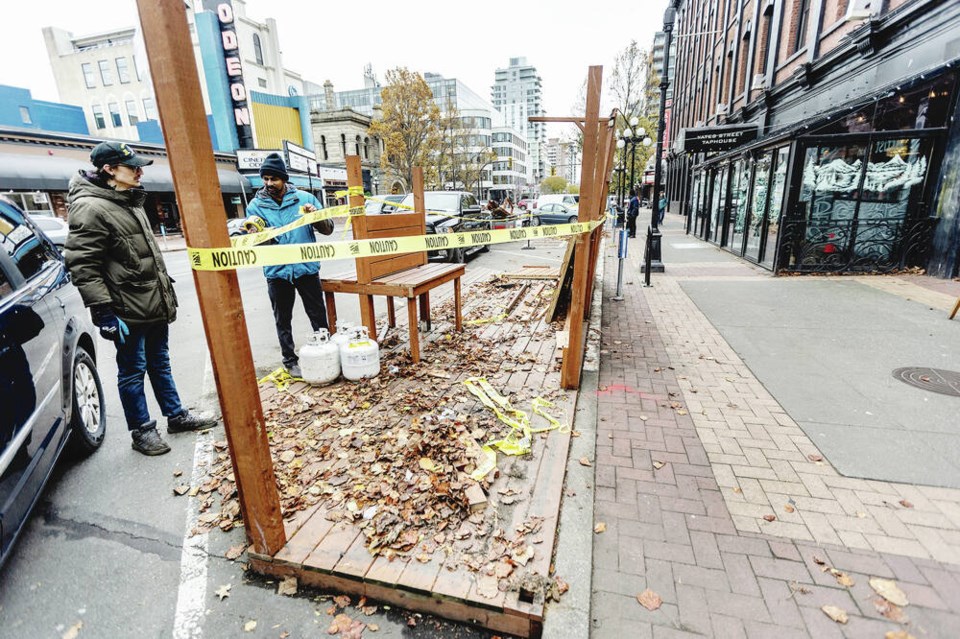Downtown businesses are hoping the City of Victoria will take a common-sense approach to a planned new patio bylaw that could be in place before spring.
The city has said it plans to establish more firm guidelines and regulations for patios, but businesses hope the new rules won’t be too heavy-handed, arguing the patios that have dotted downtown through the pandemic added vibrancy to the core.
Council is expected to discuss the issue this week.
Jeff Bray, executive director of the Downtown Victoria Business Association, said he wants to see a fee structure that is fair and reasonable, and design guidelines and processes that accommodate the needs of businesses.
A report prepared by staff says a new bylaw should ensure streetscapes and public spaces are enhanced through the patio program, that patios are safe, accessible and provide functional access to public infrastructure, and that licence application and approval services are fair, flexible and timely.
The bylaw is expected to address the types and locations of patios, and fees and processes, and also outline mandatory, recommended and prohibited elements.
The Business Recovery from Pandemic Bylaw and related Build Back Victoria program permitted patios so businesses could meet pandemic-related social distancing requirements, but are due to expire at the end of March next year.
The program was extended twice to help with economic recovery as the pandemic started to wane and restrictions were relaxed. Victoria council also streamlined the application process for patios and established a pilot project for a mobile vending business licence.
City staff told the Times Colonist any new patio bylaw program would allow for some level of creativity and flexibility.
The previous council lauded the addition of patios over the past two years, and the staff report notes feedback from residents and the business community has been overwhelmingly positive.
But it says lessons were learned to ensure quality, equity, safety and accessibility.
Bray said if businesses are expected to invest more in their outdoor spaces to ensure accessibility and meet fire codes, there has to be some flexibility in how the patio areas are put together, recognizing many won’t be able to use them year-round and will never recoup the investment.
“Let’s make sure we have patio designs that allow maximum use of those patios for the most amount of time during the year, which would then make the investment make sense,” he said — which could mean being flexible on the kinds of roofing allowed or wind-baffling material.
Solomon Siegel, co-owner of Pagliacci’s restaurant, said he’s hoping the new council will recognize that everyone loves the patios and wants them to stay. “I think whomever [at the city] solidifies this will be a hero,” Siegel said. “This is not controversial and there is no downside — we just have to come together to make rules that make sense.”
Siegel said the patio area established in front of his restaurant on Broad Street was built to last and beautify the city, as were others around the downtown. “They bring a lot of life and energy and something beautiful to the city — I think there is huge value there,” he said.
Siegel said the restaurant has run into problems, however, trying to heat its patio area, and he’s hoping the new guidelines will help with that.
The city undertook a comprehensive review of the remaining patios that were established under the pandemic’s Build Back Victoria program.
While 98 outdoor patio spaces were established over the last three years, only 36 were expected to remain in use until March 31, when the program expires.
As of last month, 18 temporary patios had been removed.
According to the city, some businesses removed their patios because they no longer needed the space or chose not to maintain them in the winter, and some were removed at the request of the city because they didn’t comply with bylaw or permit terms. The cost of the patio removal was borne by the business operator.
Bray said they never expected all of the patios and outdoor retail areas established during the pandemic to stay in place on an ongoing basis.
He said during the early days of the pandemic, occupancy restrictions necessitated outdoor options, and patios helped many small and medium-sized restaurants to survive.
“What the patio space did was allow you to get more of your occupancy without having to change your liquor licence or anything,” he said. “It worked very well.”
At the time, the city took a “bureaucracy light” approach to approving the use of outdoor spaces, as it hoped to play a role in helping businesses get through the worst of the pandemic.
“You really could put up almost anything as long as it was reasonably safe,” said Bray. “The standards were relaxed in order to get these things up and running.”
Now that things are more or less back to normal, Bray said many of the businesses have let their outdoor spaces go, with some no longer seeing the upside of the added investment.
aduffy@timescolonist.com
>>> To comment on this article, write a letter to the editor: letters@timescolonist.com



